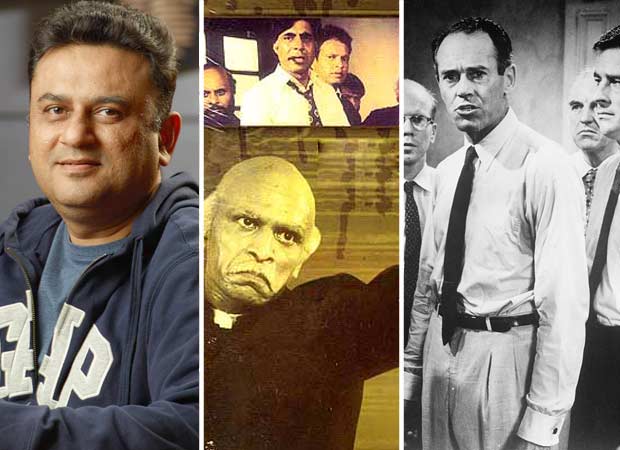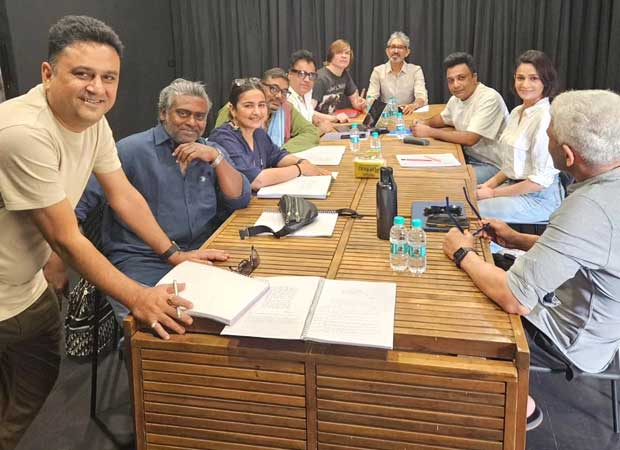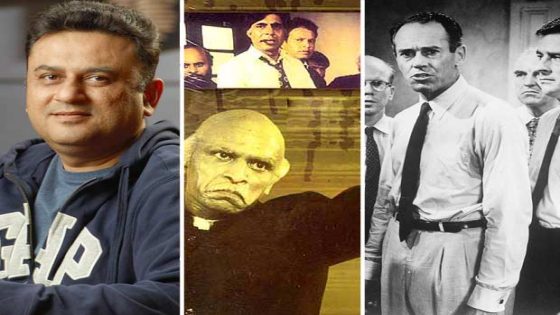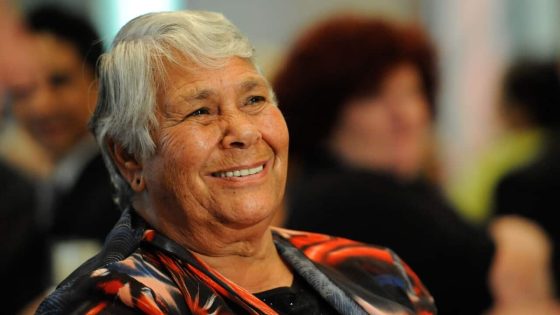Late filmmaker Basu Chatterjee’s Ek Ruka Hua Faisla (1986) is considered among one of the classics of Indian cinema. The film was a remake of the Hollywood classic 12 Angry Men (1957) and it starred KK Raina, Pankaj Kapur, Annu Kapoor, MK Raina, Deepak Qazir, among others. It tackles the story about a group of jury members deciding the fate of a youngster accused of murder.

EXCLUSIVE: Ek Ruka Hua Faisla remake director Darshan Trivedi on the crime shown in the film, “If it was a simple murder…”; also reveals why he didn’t remake the original source 12 Angry Men
Now, filmmaker Darshan Ashwin Trivedi has adapted the 1986 film in today’s time with the same title. He has cast the 12 actors in the form of Atul Kulkarni, Suvinder Vikki, Dibyendu Bhattacharya, Neeraj Kabi, Divya Dutta, Vineet Kumar, Tannishtha Chatterjee, Kani Kusruti, Hemant Kher, Samvedna Suwalkar, Luke Kenny and Manu Rishi Chaddha. In an exclusive chat with Bollywood Hungama, Trivedi spoke about his adaptation, the challenges he faced and more.
When did you do the faisla of adapting Ek Ruka Hua Faisla?
(laughs). So, basically, Ek Ruka Hua Faisla has always been one of my favourite films. I am also very vocal about it. Our film’s lead producer Anil Mevada, who met me at a party, said that he wants to produce a film. I was only paying partial attention to it. Then he said that he wants to do a remake of Ek Ruka Hua Faisla. So, for two minutes I was silent. I was not expecting that from him because we were talking a lot about Tamil and Telugu cinema. I was a bit shocked that this film is among the ones he likes.
This film is a part of a course in the law schools across India. And a lot of management schools also teach how to take a decision (by showing this film). I told him if we do it, we should do it from the current perspective and that’s where I came in the picture. I said the jury system was abolished even when the original Ek Ruka Hua Faisla had released. I said if we wish to reinterpret it in today’s context, then I would be very interested in directing it. He said, ‘You have a free hand.’ Last year, we acquired the rights from Eagle Films. I said we have to do it in a righteous way, otherwise there is no point in doing something like this.
I did some research and spoke to professors from law universities and supreme court lawyers. I realized that there is close to 0% chance of bringing back the jury system in India. That’s why we are calling it an adaptation. We have made changes that reflect the representation of today’s society. From the socio-cultural and diversity aspect also.


As you said, jury system has long gone by in India. Which situation have you shown in the film?
There is a provision in the legal system in certain cases, especially in certain socio-legal issues. When a High Court judge cannot take a decision, he has the power to form a commission. Also, in the original film and Ek Ruka Hua Faisla, we have always been looking at men. I wanted to see the representation of women in the legal system also. I felt you can’t take a decision by taking only people from one gender. So, we also have someone from the LGBTQ community in the commission.
Why is your film called an adaptation of Ek Ruka Hua Faisla since that film itself was based on 12 Angry Men?
The basis of that is again the legal aspect. 12 Angry Men was made years back. It was 60 years ago. From my legal advisors, if I just had to do an adaptation of that film, I could have done that because it’s in that space where you can do an adaptation without taking the rights. However, in India a film has been made on that and it hasn’t been 60 years yet. And we wanted to be fair to somebody’s work. Personally, I am a big fan of Basu da’s work. And this is my favourite film of Basu da. So, I thought I might as well go the legal route. Because we are talking about law, we don’t want to offend anybody.
In 12 Angry Men and Ek Ruka Hua Faisla, they tackled the case of a murder. Your film will also show the same crime?
The crime shown here is murder, but the context is different. If it was a simple murder, there wouldn’t have been a need for a commission. Not only as a filmmaker but also as a researcher, I have touched upon the aspect through which the High Court would want to form a commission if they are unable to come to a conclusive decision. It’s a bit complicated but it’s righteous and more believable from the current perspective and point of time. That’s the unique part of this film. That’s why we call it an adaptation.
As your film is an adaptation of Ek Ruka Hua Faisla in today’s times, have you used fresh techniques in shooting your film? And is your film also shot indoors entirely?
For some breathing space or whatever you call it, it does go out very briefly for reference. We have brought the reference. Like how you said, we wanted to bring in the narrative style of today for breathing elements.
Casting becomes extremely important in such films. How challenging was it to bring these 12 actors together?
I would give full credit to my casting director Kunal M Shah. He is a very good friend. We reached out to him and said that this is now a problem statement that we need to solve. We created a list of 50 actors with each character having four options. You won’t believe that in 85% of the cases, we were able to shortlist the number one actor. They were kind enough to support the film. I have a very specific way of working. They all supported me with that. I am quite happy with their dedication to this film. We shot the film in Filmcity.
Is Atul Kulkarni playing the role of KK Raina from the 1986 film?
I would not draw parallel to the characters because we have merged certain characters. There are diluted borders of the characters because we have made layered characters. As we have made the film in today’s times, we have referred to a lot of things from today. Like the ethnic and language diversity of India. That’s why we also had to dilute certain traits of characters because they needed.
Apart from casting, which was the biggest challenge of making the film?
The biggest challenge was to have 12 people commit their time and availability for readings. Because of OTT, every actor was so busy that they didn’t have dates. I am also very happy for the actors that they don’t have time. I also keep telling this to them. And they were very supportive. If someone had a couple of hours, they would come. So, doing the prep was a big challenge. The people we had to let go off were people who were not available because of time commitments. There is one gentleman we couldn’t bring on board because of budget issues. But he had also said yes to the film. So, honestly speaking, nobody we approached said no to the film. That’s the merit of the original film.
Our other challenge was to bring the insight of entire India in one room. So, we have a Punjabi character, a Malayalee girl, a Goan guy, a Gujarati guy, a Muslim character, a Bengali character, a Marathi character, etc.
What is the current status of the film?
The film is in the DI and final sound stage. So, we are currently speaking to the distributors and platforms. The film should be out soon. Technically the film is almost ready. If everything goes well, we will want to release it this year. Else, early next year.
Also Read: EXCLUSIVE: KK Raina on Ek Ruka Hua Faisla remake, “No harm in it, but…”
BOLLYWOOD NEWS – LIVE UPDATES
Catch us for latest Bollywood News, New Bollywood Movies update, Box office collection, New Movies Release , Bollywood News Hindi, Entertainment News, Bollywood Live News Today & Upcoming Movies 2024 and stay updated with latest hindi movies only on Bollywood Hungama.
Source Agencies




